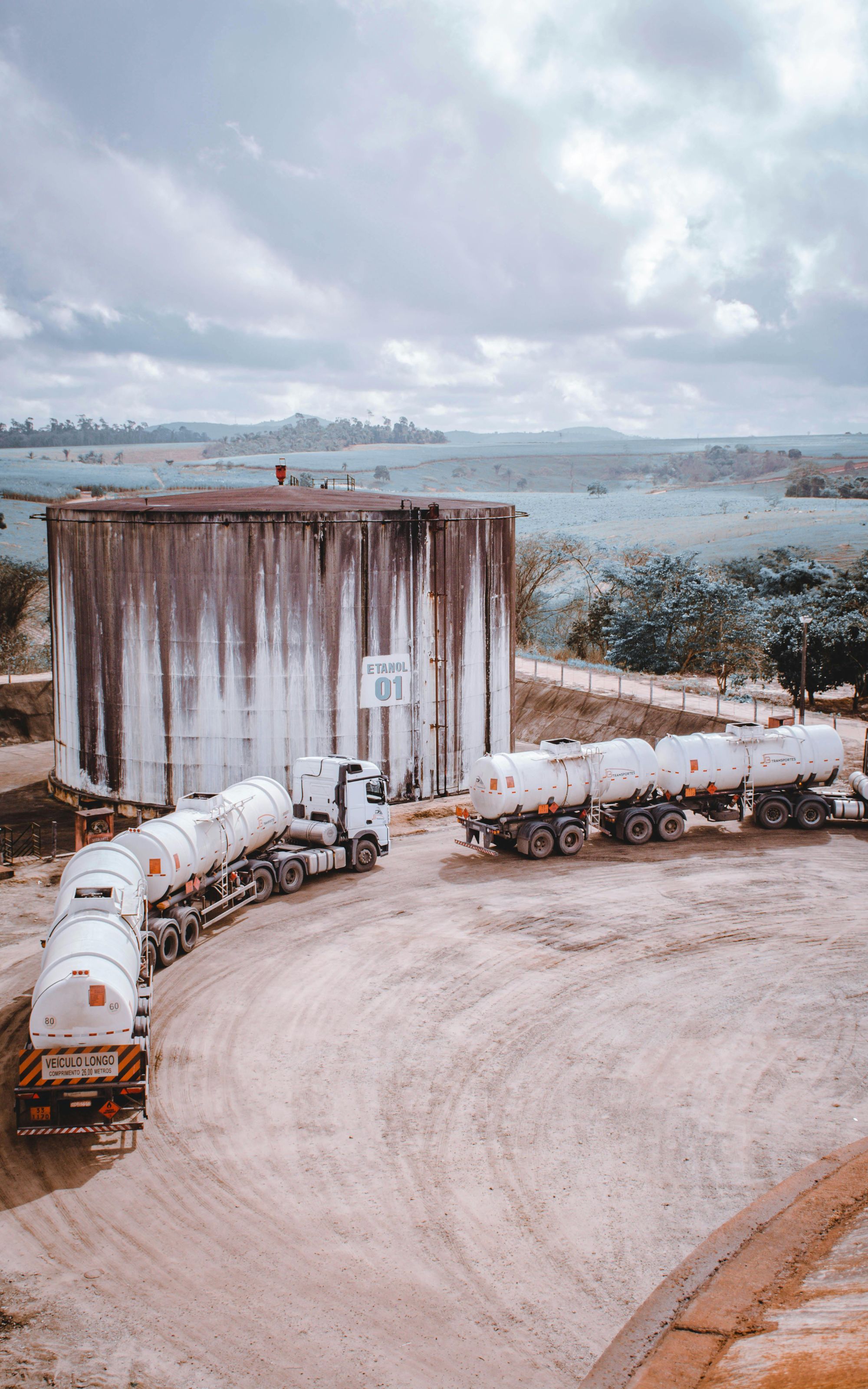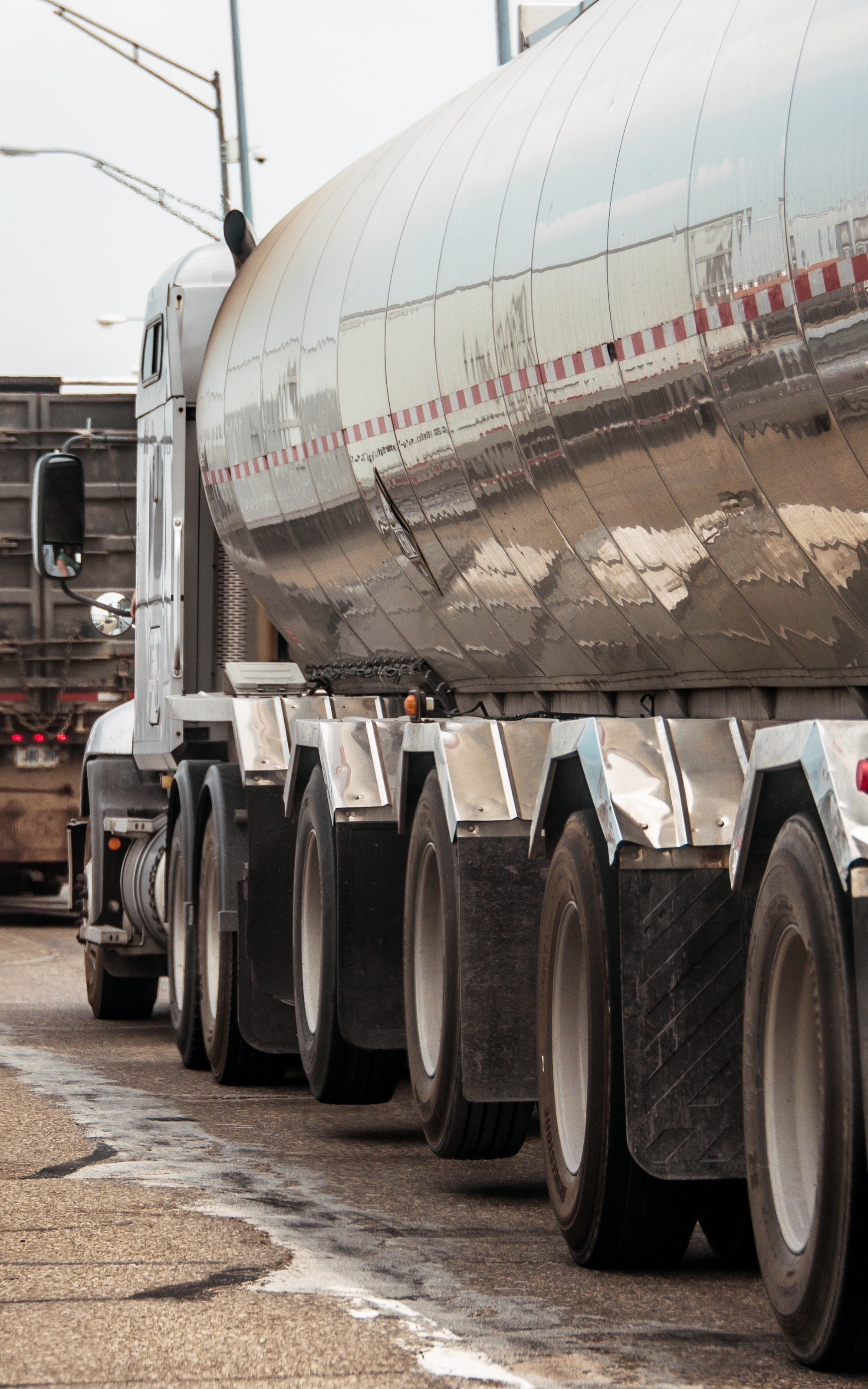Food Grade Tank Trailers
Food grade tank trailers are specifically designed to transport edible liquids and semi-liquids, such as milk, juices, oils, and syrups. These trailers adhere to strict sanitation standards to prevent contamination and maintain product quality throughout the transportation process.
Food grade tankers are typically constructed from stainless steel or food-grade aluminum to ensure easy cleaning and sanitization between loads. They often feature temperature control systems to preserve the freshness of perishable products during transit.
Fuel Tank Trailers
Fuel tank trailers are essential for transporting various types of petroleum products, including gasoline, diesel, and aviation fuel. These trailers are designed with safety as a top priority, featuring multiple safeguards to prevent leaks, spills, and potential fire hazards.
Fuel tankers are typically constructed from aluminum or stainless steel to resist corrosion and maintain the purity of the fuel. They are equipped with specialized loading and unloading systems, as well as vapor recovery mechanisms to minimize emissions during the transfer process.
Gas Tank Trailers
Gas tank trailers are designed to transport compressed or liquefied gases, such as propane, nitrogen, and carbon dioxide. These trailers are built to withstand high pressures and maintain the integrity of their gaseous cargo under various conditions.
Gas tankers feature robust construction, typically using high-strength steel or specialized alloys. They are equipped with pressure regulation systems, safety relief valves, and insulation to maintain the desired temperature and pressure of the gas during transit.
Other Specialized Tank Trailers
In addition to the common types mentioned above, there are various specialized tank trailers designed for specific industries and applications. These include:
-
Asphalt tankers: Equipped with heating systems to maintain the viscosity of hot asphalt during transport.
-
Vacuum tankers: Used for transporting and disposing of liquid waste and sewage.
-
Powder tankers: Designed to transport dry, powdered materials such as cement or flour.
-
Bitumen tankers: Specialized for transporting hot bitumen used in road construction.
These specialized tankers often incorporate unique features tailored to their specific cargo requirements, ensuring safe and efficient transportation of diverse materials.
Silo Trailers
Silo trailers are designed for the transportation of dry, granular materials such as grains, animal feed, cement, and plastic pellets. These trailers feature a cylindrical or conical tank structure that allows for easy loading from the top and unloading through gravity or pneumatic systems.
Silo trailers are constructed with lightweight materials like aluminum to maximize payload capacity while maintaining structural integrity. They often incorporate features such as aeration systems to prevent product compaction and facilitate easier unloading.
Tank Trailer Capacities and Specifications
Small vs Large Tanker Trailer Capacities
Tank trailers come in a wide range of sizes to accommodate different transportation needs and comply with road regulations. Small tanker trailers typically have capacities ranging from 1,000 to 5,000 gallons, while large tankers can hold up to 11,600 gallons or more.
The choice between small and large tanker trailers depends on factors such as the type of product being transported, the distance of the haul, and local weight restrictions. Smaller tankers offer greater maneuverability and are often used for local deliveries, while larger tankers are more efficient for long-haul transportation of bulk quantities.
|
Tanker Size
|
Typical Capacity Range
|
|
Small
|
1,000 - 5,000 gallons
|
|
Medium
|
5,000 - 8,000 gallons
|
|
Large
|
8,000 - 11,600+ gallons
|
Product Holding Capacity by Trailer Type
Different types of tank trailers have varying capacities based on their design and the specific products they are intended to transport. Here's an overview of typical capacities for various tank trailer types:
-
Chemical tankers: 4,000 - 7,000 gallons
-
Food grade tankers: 5,000 - 7,500 gallons
-
Fuel tankers: 5,000 - 11,600 gallons
-
Gas tankers: 3,000 - 11,000 gallons (depending on gas type)
-
Silo trailers: 1,000 - 2,000 cubic feet
It's important to note that these capacities can vary based on specific trailer designs and regulatory requirements in different regions.
Weight Considerations for Tank Trailers
Weight is a critical factor in tank trailer operations, as it affects both the payload capacity and compliance with road regulations. The gross vehicle weight rating (GVWR) of a tank trailer combination typically ranges from 80,000 to 100,000 pounds, depending on local regulations and the number of axles.
Factors influencing the weight of tank trailers include:
-
Trailer construction material (e.g., aluminum vs. steel)
-
Product density
-
Insulation and heating systems
-
Additional equipment (e.g., pumps, compressors)
Operators must carefully consider these factors to maximize payload while staying within legal weight limits and ensuring safe transportation.
Safety Features in Tank Trailers
Use of Baffles to Prevent Liquid Surge
Baffles are internal partitions or plates installed within tank trailers to minimize liquid movement during transport. These structures play a crucial role in maintaining vehicle stability and preventing accidents caused by sudden shifts in the cargo's center of gravity.
The design and placement of baffles vary depending on the type of liquid being transported and the trailer's specific requirements. Properly designed baffle systems can significantly improve the handling characteristics of tank trailers, especially during braking, acceleration, and cornering maneuvers.
Specialized Equipment for Different Products
Tank trailers are equipped with various specialized features and equipment to ensure the safe handling and transportation of different products. These components are tailored to the specific requirements of the cargo and may include:
-
Vapor recovery systems for volatile liquids
-
Pressure relief valves for gas tankers
-
Heating coils for temperature-sensitive products
-
Corrosion-resistant linings for chemical tankers
-
Clean-in-place (CIP) systems for food grade tankers
By incorporating these specialized features, tank trailer operators can maintain product integrity, comply with safety regulations, and minimize the risk of accidents or product contamination during transport.
Why Choose Goods2load's Partners for Tanker Services?
Goods2load's partners offers exceptional tanker services that set them apart in the industry. Here are some key reasons to choose our partner:
Safety and Compliance
All our partner's tankers meet stringent safety standards and are regularly inspected to ensure they are in top condition. This commitment to safety and compliance provides peace of mind for clients and helps minimize the risk of accidents or product contamination during transport.
Experienced Operators
Our partner's drivers are trained and experienced in handling tankers, ensuring safe and timely delivery of your goods. Their expertise in managing various types of tank trailers and understanding the unique requirements of different products contributes to smooth and efficient operations.
Customized Solutions
Goods2load have different logistics partners for various industries, providing customized solutions tailored to meet the specific needs of each industry., ensuring that each type of liquid or material is transported in the most suitable tanker. This customized approach allows us to meet the specific needs of our clients and optimize their logistics operations.
Choosing the Right Tank Trailer with Goods2load
Factors to Consider When Selecting a Tank Trailer
Selecting the appropriate tank trailer for your transportation needs is crucial for ensuring efficient and safe operations. Goods2load can assist you in evaluating the following factors to make an informed decision:
-
Product characteristics (e.g., viscosity, corrosiveness, temperature requirements)
-
Required capacity and payload
-
Regulatory compliance for specific products
-
Route considerations (e.g., weight restrictions, terrain)
-
Loading and unloading requirements
-
Maintenance and cleaning needs
By carefully assessing these factors, Goods2load can help you choose a tank trailer that optimizes your logistics operations and meets all necessary safety and regulatory standards.
Customization Options for Specific Needs
Goods2load understands that some transportation requirements may call for specialized solutions. Our partners offer customization options for tank trailers to meet unique industry needs, including:
-
Multi-compartment designs for transporting multiple products
-
Specialized loading and unloading systems
-
Advanced temperature control and monitoring equipment
-
Enhanced safety features for hazardous materials
-
Integration of telematics and tracking systems
Our team works closely with clients to develop tailored solutions that address specific operational challenges and maximize efficiency in tank trailer transportation.
Applications of Tank Trailers
Petroleum and Crude Oil Transport
Tank trailers play a vital role in the petroleum industry, facilitating the transportation of crude oil and refined products from extraction sites to refineries and distribution centers. These specialized tankers are designed to handle the unique properties of petroleum products, including their flammability and potential environmental impact.
Key considerations for petroleum and crude oil transport include:
-
Corrosion-resistant materials to prevent product contamination
-
Vapor recovery systems to minimize emissions
-
Heating systems for heavy crude oils
-
Compliance with hazardous materials regulations
Chemical Industry Uses
The chemical industry relies heavily on tank trailers for the safe and efficient transport of a wide range of substances, from basic chemicals to specialized compounds. Chemical tankers are designed to handle diverse products with varying levels of corrosiveness, reactivity, and toxicity.
Applications in the chemical industry include:
-
Transport of acids, bases, and solvents
-
Delivery of raw materials to manufacturing facilities
-
Distribution of finished chemical products
-
Handling of hazardous waste materials
Food and Beverage Transportation
Food grade tank trailers are essential for maintaining the quality and safety of edible liquids and semi-liquids during transport. These specialized tankers adhere to strict sanitation standards and often feature temperature control systems to preserve product freshness.
Common applications in the food and beverage industry include:
-
Milk and dairy product transportation
-
Bulk liquid sweeteners and syrups
-
Edible oils and fats
-
Fruit juices and concentrates
Gas and LPG Delivery
Gas tank trailers are crucial for the distribution of various gases, including liquefied petroleum gas (LPG), industrial gases, and medical gases. These trailers are designed to withstand high pressures and maintain the integrity of gaseous products during transport.
Key applications for gas tankers include:
-
Residential and commercial LPG delivery
-
Industrial gas supply for manufacturing processes
-
Medical gas distribution to healthcare facilities
-
Cryogenic gas transport for specialized applications
Economic Impact of Tank Trailers
Role in Supply Chain and Logistics
Tank trailers play a crucial role in the global supply chain, facilitating the efficient movement of bulk liquids, gases, and powdered materials. Their impact on logistics includes:
-
Enabling just-in-time inventory management
-
Reducing storage requirements at production facilities
-
Facilitating the distribution of products to diverse markets
-
Supporting the growth of industries reliant on bulk transportation
The versatility and efficiency of tank trailers contribute significantly to the smooth operation of various industries and the overall economy.
Cost-Effectiveness Compared to Other Transport Methods
Tank trailers offer several cost advantages compared to alternative transportation methods:
-
Higher payload capacity than smaller container-based transport
-
Lower per-unit transportation costs for bulk quantities
-
Reduced handling and packaging requirements
-
Flexibility in route planning and delivery schedules
-
Potential for backhaul opportunities to maximize efficiency
These factors contribute to the cost-effectiveness of tank trailers, making them an attractive option for businesses looking to optimize their logistics operations.



